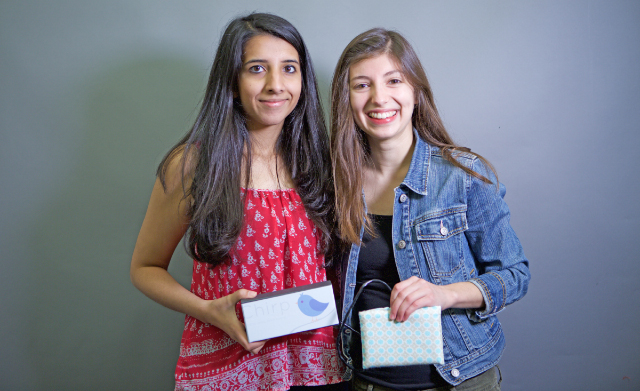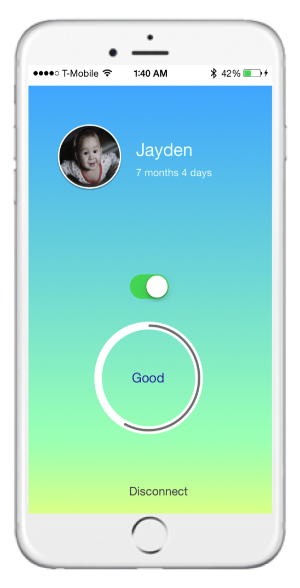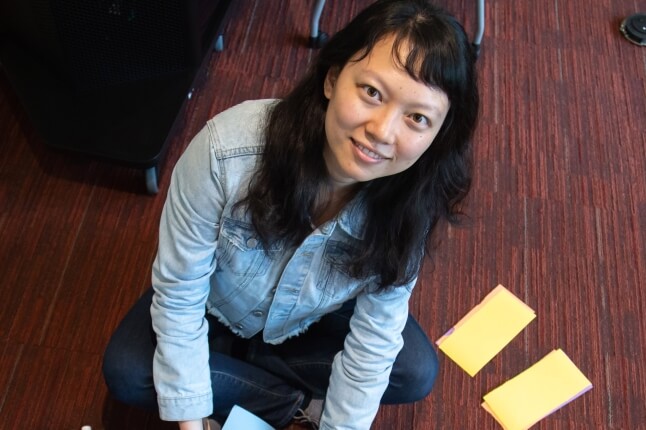News
Students Risham Dhillon, A.B. '18, a computer science concentrator, and Phoebe Stoye, A.B. '18, a neurobiology concentrator, developed Chirp, which is a system that uses sensors and a mobile app to help prevent infants from being left unattended in hot cars. (Photo by Adam Zewe/SEAS Communications.)
So far this year, 39 U.S. infants and toddlers have died of heat stroke due to being left unattended in hot cars. In an effort to prevent such tragedies, two Harvard students are developing a tech-driven car seat alert system.
Chirp, a startup co-founded earlier this year by Phoebe Stoye, A.B. ’18, a neurobiology concentrator, and Risham Dhillon, A.B. ’18, a computer science concentrator at the John A. Paulson School of Engineering and Applied Sciences, uses sensor technology and a mobile app to warn caregivers when babies are in danger of being left alone in car seats.
After reading news reports this spring about a spike in hot-car baby deaths, the two friends and roommates set out to tackle this issue using their combined expertise. Stoye has experience in electrical engineering and also conducts infant development research at Boston Children’s Hospital and Dhillon has held several industry internships centered on the use of sensors in “Internet of Things” technology.
“Sensors are being used in so many other situations, like notifying people that the milk container in their fridge is empty,” Dhillon said. “We wondered why sensors weren’t being applied to this public health issue. We have a chance to use this technology to do real, tangible good.”

Students Risham Dhillon (left) and Phoebe Stoye developed Chirp to help prevent infant deaths in hot cars. (Photo by Adam Zewe/SEAS Communications.)
The system involves a pressure sensor that can be installed under the lining of a car seat. An Arduino circuit board connected to the sensor synchronizes with the Chirp app on a parent’s mobile phone. When the pressure sensor is activated by the baby’s weight, the parent’s phone will repeatedly vibrate and beep if he or she walks far enough away from the car seat. The phone won’t stop buzzing and beeping until the parent moves closer.
The system uses low-energy Bluetooth technology to activate the mobile phone and also to measure signal strength between the phone and sensor, which is how Chirp determines that a parent has walked too far.
“The beauty of this system is that it is so simple,” Stoye said. “We wanted to develop a solution that has a low enough price point, so it can be made available in as many car seats as possible.”
But there are challenges involved in convincing parents they need a system like Chirp. Awareness of the issue is low in cooler parts of the country, and many caregivers believe substance abuse or malicious intent plays a role in most of these infant deaths. However, research conducted by Jan Null, Professor in the Department of Meteorology and Climate Science at San Jose State University, shows that only 7 percent of cases involved drugs or alcohol, and deaths have occurred in all parts of the country, including Massachusetts, Maine, Connecticut, Wisconsin, and Minnesota. In 54 percent of cases, caregivers said they forgot their child was in the car, pointing to routine changes or distractions that can impact any parent.
As a venture team in the Harvard Innovation Lab and through the SEAS course “Startup R&D” (ES 95R), the students are continuing to refine the prototype and develop their startup. They plan to reach out to car seat manufacturers about incorporating this technology into their products.
 At the same time, they are working on new features that will allow the system to connect to more than one mobile device, and are also looking to incorporate SMS text messaging service functionality so that a different emergency contact could receive text message alerts from Chirp.
At the same time, they are working on new features that will allow the system to connect to more than one mobile device, and are also looking to incorporate SMS text messaging service functionality so that a different emergency contact could receive text message alerts from Chirp.
One problem the team is trying to tackle is the issue of phones running out of battery and not connecting to the sensor. A caregiver might not notice that the battery ran out of charge and the phone is no longer connected to the car seat, creating a potentially dangerous situation. By sending a text message to an emergency contact, Chirp could alert a different caregiver that the baby is in the car seat.
Yet technology is only one piece of the solution. The Hot Car Act of 2016, legislation that was recently introduced in the U.S. House of Representatives, would require all new cars produced two years after its passage to incorporate technology designed to prevent unattended infant fatalities.
By targeting car seat manufacturers, the students hope they could spread this life-saving technology even further. They realize solving this problem will require more than technology, and want their startup to contribute to the discussion on all fronts, including research, advocacy, and policy.
“We are strong believers that you can use simple technology to make a great impact,” Dhillon said. “At the end of the day, if our work is able to save one baby’s life, it will have been worth it.”
Topics: Entrepreneurship
Cutting-edge science delivered direct to your inbox.
Join the Harvard SEAS mailing list.
Press Contact
Adam Zewe | 617-496-5878 | azewe@seas.harvard.edu



